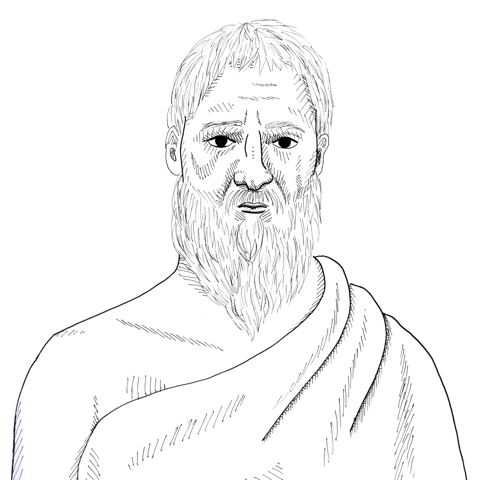
Socrates on the Good in Death
Found in: Dialogues, vol. 2
The Apology was one of the Dialogues written by Plato about his teacher Socrates. It records the trial of Socrates on charges of impiety and the corruption of the youth of Athens, held in 399 BCE. Most of the Apology records Socrates’ speeches, delivered to his judges and the jury, defending himself from their charges. He was ultimately found guilty and sentenced to death (the details of which are covered in another of the Dialogues, the Phaedo).
The following excerpt occurs at the very end of the Apology, after Socrates has received his sentence of death:
Philosophy
“Let us reflect in another way, and we shall see that there is great reason to hope that death is a good; for one of two things—either death is a state of nothingness and utter unconsciousness, or, as men say, there is a change and migration of the soul from this world to another. Now if you suppose that there is no consciousness, but a sleep like the sleep of him who is undisturbed even by dreams, death will be an unspeakable gain. For if a person were to select the night in which his sleep was undisturbed even by dreams, and were to compare with this the other days and nights of his life, and then were to tell us how many days and nights he had passed in the course of his life better and more pleasantly than this one, I think that any man, I will not say a private man, but even the great king will not find many such days or nights, when compared with the others. Now if death be of such a nature, I say that to die is gain; for eternity is then only a single night. But if death is the journey to another place, and there, as men say, all the dead abide, what good, O my friends and judges, can be greater than this? If indeed when the pilgrim arrives in the world below, he is delivered from the professors of justice in this world, and finds the true judges who are said to give judgment there, Minos and Rhadamanthus and Aeacus and Triptolemus, and other sons of God who were righteous in their own life, that pilgrimage will be worth making. What would not a man give if he might converse with Orpheus and Musaeus and Hesiod and Homer? Nay, if this be true, let me die again and again. I myself, too, shall have a wonderful interest in there meeting and conversing with Palamedes, and Ajax the son of Telamon, and any other ancient hero who has suffered death through an unjust judgment; and there will be no small pleasure, as I think, in comparing my own sufferings with theirs. Above all, I shall then be able to continue my search into true and false knowledge; as in this world, so also in the next; and I shall find out who is wise, and who pretends to be wise, and is not. What would not a man give, O judges, to be able to examine the leader of the great Trojan expedition; or Odysseus or Sisyphus, or numberless others, men and women too! What infinite delight would there be in conversing with them and asking them questions! In another world they do not put a man to death for asking questions: assuredly not. For besides being happier than we are, they will be immortal, if what is said is true.” (FROM: Apology)